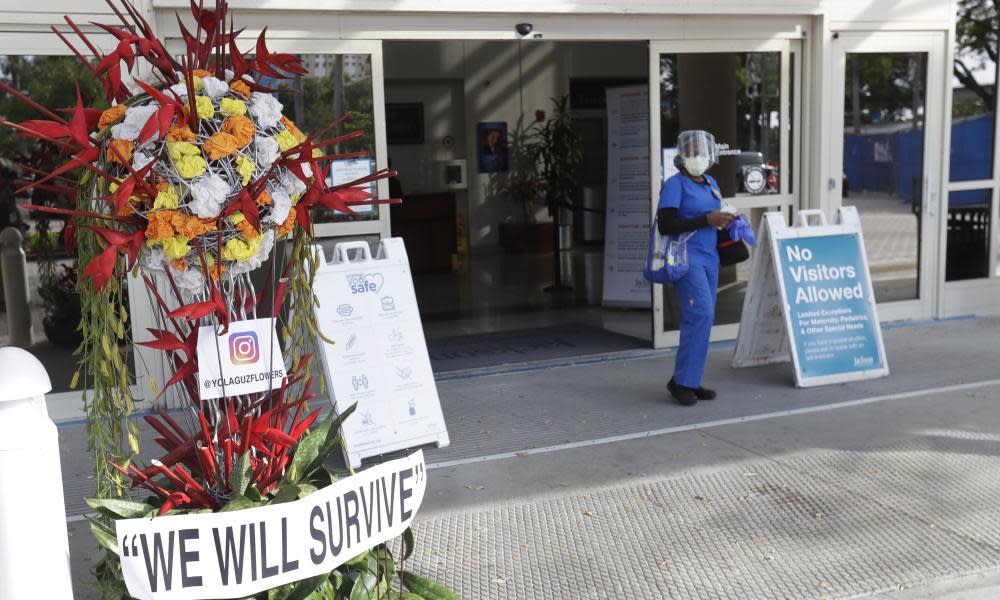'Things have not gone according to plan': America's coronavirus reopening falls apart

In echoes of the early days of the Covid-19 pandemic, some American states and localities are reversing economic reopenings after spread of the coronavirus accelerated in some regions.
America’s Sun Belt, the region extending from southern California to Florida, has been particularly hard-hit, and now further flung and less populous states are joining the ranks rolling back reopenings.
New Mexico again banned indoor dining. Nevada closed bars in counties with major outbreaks. And Oregon, in the Pacific north-west, banned private indoor gatherings of more than 10 people. Arizona and Texas reimposed restrictions on indoor dining and bars in early July.
California, the most populous state, dramatically expanded restrictions. Indoor operations of theaters, wineries, restaurants and bars were all stopped this week. In addition, some of the nation’s largest school districts have announced classes will be virtual this fall. Students in Los Angeles, San Diego and Atlanta will not have in-person classes.
Related: Fauci warns young of Covid-19 risks and says crisis could match 1918 flu
“The reopening plan was great if everything went well,” the Miami mayor, Francis X Suarez, told the Republican Florida governor, Ron DeSantis, at a public roundtable Tuesday. “But I think the fact is things have not gone according to plan.”
“If things do not improve quickly … I think we’re going to be under a significant amount of pressure” to shut down, Suarez said.
Florida closed indoor dining in late June but has persisted with other reopening plans. DeSantis called on schools to reopen in a few weeks, and Disney World reopened some of its parks to thousands of visitors on Saturday.
"If you're not in an at-risk group you could still be an asymptomatic carrier" says @GovRonDeSantis at Miami event pic.twitter.com/1Xtj7EU8MT
— Christopher Heath (@CHeathWFTV) July 14, 2020
Republican officials moved the national convention, where Donald Trump will formally accept the nomination of his party, from North Carolina to Florida to avoid social distancing and mask requirements. But with cases rising, officials moved the biggest events outdoors, the New York Times reported.
Louisiana, an early center of outbreaks after Mardi Gras this spring, has again seen a spike in Covid-19 cases. Vice-president Mike Pence traveled to the state on Tuesday but was not greeted by one of its top officials, attorney general Jeff Landry, who tested positive for Covid-19 despite showing no symptoms.
The governor, John Bel Edwards, enacted a statewide mask mandate for people aged eight and older, which took effect Monday. He also returned bars to takeout and delivery only. Restaurants, casinos, gyms, salons and other businesses remain open, with occupancy restrictions.

But America’s vast landscape and varied politics means even as many states across the south and west roll back reopening, places whose overburdened health systems became emblematic of the perils of Covid-19 have continued to reopen.
The New York governor, Andrew Cuomo, will allow malls to reopen in some parts of the state. New York City hit a hopeful milestone on Saturday: for the first time since 11 March, no one died of coronavirus.
“It’s something that should make us hopeful, but it’s very hard to take a victory lap because we know we have so much more ahead,” said the mayor, Bill de Blasio, on Monday, according to NPR. “This disease is far from beaten.” While New York state announced only 677 new cases of coronavirus on Sunday, Florida reported more than 15,000.
In contrast to states in the south and west, some parts of the north-eastern economy never reopened. In New York City, Broadway shows are likely to remain closed until at least this winter, and indoor dining is still banned.
Across the river in New Jersey, gyms remain closed. Indoor dining in New Jersey was slated to reopen at very limited capacity, but the proposal was rolled back after photos emerged of unmasked crowds at beach bars on the Jersey shore.
Unlike in states such as New York, which has metrics that would trigger closures if the virus began to spread, Miami mayors said Florida had no such plan.
Related: I'm from Florida. Our coronavirus crisis doesn't surprise me | Geoffrey Kabaservice
Renewed restrictions in the south and west have also brought renewed frustration. In New Mexico, businesses forced to close their doors again protested against the governor’s order. “At some point you have to protect your livelihood,” Kathy Diaz, owner of Monroe’s Restaurant, told local news station KOB4.
Parents of schoolchildren in Jacksonville, Florida, called for school reopenings, and anti-mask protesters have organized demonstrations against local mask mandates.
Marlyn Hoilette, a nurse who spent four months working in the Covid-19 unit of her Florida hospital until testing positive recently, said she worries about returning to work.
“Nurses are getting sick, nursing assistants are getting sick and my biggest fear is that it seems we want to return folks to work even without a negative test,” said Hoilette, who works at Palms West hospital in Loxahatchee, Florida. “It’s just a matter of time before you wipe the other staff out if you’re contagious, so that is a big problem.”


